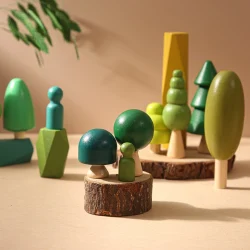What role do educational toys play in child development?
2023-10-31
Educational toys can play a significant role in child development by providing a fun and engaging way for children to learn and develop various skills. Here are some of the key roles that educational toys can have in child development:
1. Cognitive Development: Educational toys can stimulate a child's cognitive development by encouraging problem-solving, critical thinking, and logical reasoning. Puzzles, building blocks, and board games are examples of toys that can enhance cognitive skills.
2. Language Development: Toys like books, educational games, and toys with letters or numbers can help improve a child's language skills, vocabulary, and reading readiness.
3. Mathematical Skills: Educational toys that involve counting, sorting, and basic mathematical concepts can help children develop math skills and a better understanding of numbers.
4. Fine Motor Skills: Manipulating and playing with small toys, like building blocks or puzzles, can enhance a child's fine motor skills and hand-eye coordination.
5. Social Skills: Many educational toys are designed for cooperative play, which helps children develop social skills such as sharing, taking turns, and teamwork.
6. Creativity and Imagination: Toys that encourage creative play, such as art supplies, role-play sets, and open-ended building toys, can foster a child's creativity and imagination.
7. Sensory Development: Toys with different textures, colors, and shapes can aid in sensory exploration and development in younger children.
8. Scientific and Problem-Solving Skills: STEM (Science, Technology, Engineering, and Mathematics) educational toys can introduce children to scientific concepts and encourage experimentation and problem-solving.
9. Spatial Awareness: Building toys like LEGO or construction sets can help children develop an understanding of spatial relationships and geometry.
10. Emotional Development: Educational toys can promote emotional development by allowing children to express and manage their feelings through play.
11. Critical Thinking and Decision-Making: Toys that require decision-making, strategy, and planning can help children develop critical thinking skills.
12. Independence and Self-Esteem: Educational toys can boost a child's confidence and sense of independence as they master new skills and concepts.
13. Cultural Awareness: Toys that represent different cultures, countries, and perspectives can help children develop an understanding and appreciation of diversity.
It's important to note that the effectiveness of educational toys depends on how they are used and the child's individual needs and interests. Parents and caregivers can enhance the benefits of educational toys by engaging with their children during play, asking questions, and providing guidance as needed.
Educational toys can be a valuable addition to a child's learning environment, but they should complement other forms of learning, such as interactive play, reading, and real-world experiences. A balanced approach to child development that includes a variety of activities and toys is often the most effective.



